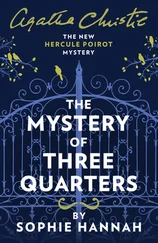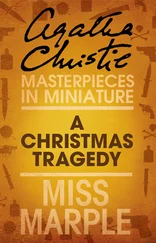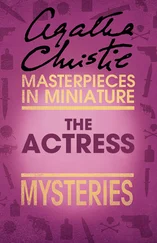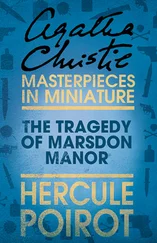Agatha Christie - Three Act Tragedy
Здесь есть возможность читать онлайн «Agatha Christie - Three Act Tragedy» весь текст электронной книги совершенно бесплатно (целиком полную версию без сокращений). В некоторых случаях можно слушать аудио, скачать через торрент в формате fb2 и присутствует краткое содержание. Жанр: Классический детектив, на английском языке. Описание произведения, (предисловие) а так же отзывы посетителей доступны на портале библиотеки ЛибКат.
- Название:Three Act Tragedy
- Автор:
- Жанр:
- Год:неизвестен
- ISBN:нет данных
- Рейтинг книги:4.5 / 5. Голосов: 2
-
Избранное:Добавить в избранное
- Отзывы:
-
Ваша оценка:
- 100
- 1
- 2
- 3
- 4
- 5
Three Act Tragedy: краткое содержание, описание и аннотация
Предлагаем к чтению аннотацию, описание, краткое содержание или предисловие (зависит от того, что написал сам автор книги «Three Act Tragedy»). Если вы не нашли необходимую информацию о книге — напишите в комментариях, мы постараемся отыскать её.
Three Act Tragedy — читать онлайн бесплатно полную книгу (весь текст) целиком
Ниже представлен текст книги, разбитый по страницам. Система сохранения места последней прочитанной страницы, позволяет с удобством читать онлайн бесплатно книгу «Three Act Tragedy», без необходимости каждый раз заново искать на чём Вы остановились. Поставьте закладку, и сможете в любой момент перейти на страницу, на которой закончили чтение.
Интервал:
Закладка:
And with that statement Mr. Satterthwaite was forced to rest content.
21
Five Upper Cathcart Road, Tooting, seemed an incongruous home for a satiric playwright. The room into which Sir Charles was shown had walls of a rather drab oatmeal colour with a frieze of laburnum round the top. The curtains were of rose-coloured velvet, there were a lot of photographs and china dogs, the telephone was coyly hidden by a lady with ruffled skirts, there were a great many little tables and some suspicious-looking brasswork from Birmingham via the Far East.
Miss Wills entered the room so noiselessly that Sir Charles, who was at the moment examining a ridiculously elongated pierrot doll lying across the sofa, did not hear her. Her thin voice saying, “How d’you do, Sir Charles. This is really a great pleasure,” made him spin round.
Miss Wills was dressed in a limp jumper suit which hung disconsolately on her angular form. Her stockings were slightly wrinkled, and she had on very high-heeled patent leather slippers.
“Fancy you finding me out here,” said Miss Wills. “My mother will be ever so excited. She just adores the theatre – especially anything romantic. That play where you were a Prince at a University – she’s often talked of it. She goes to matinees, you know, and eats chocolates – she’s one of that kind. And she does love it.”
“How delightful,” said Sir Charles. “You don’t know how charming it is to be remembered. The public memory is short!” He sighed.
“She’ll be thrilled at meeting you,” said Miss Wills. “Miss Sutcliffe came the other day, and Mother was thrilled at meeting her.”
“Angela was here?”
“Yes. She’s putting on a play of mine, you know: Little Dog Laughed .”
“Of course,” said Sir Charles. “I’ve read about it. Rather intriguing title.”
“I’m so glad you think so. Miss Sutcliffe likes it, too. It’s a kind of modern version of the nursery rhyme – a lot of froth and nonsense – Hey diddle diddle and the dish and the spoon scandal. Of course, it all revolves round Miss Sutcliffe’s part – everyone dances to her fiddling – that’s the idea.”
Sir Charles said:
“Not bad. The world nowadays is rather like a mad nursery rhyme. And the little dog laughed to see such sport, eh?” And he thought suddenly: “Of course this woman’s the Little Dog. She looks on and laughs.”
The light shifted from Mrs. Wills’s pince-nez, and he saw her pale-blue eyes regarding him intelligently through them.
“This woman,” thought Sir Charles, “has a fiendish sense of humour.”
Aloud he said:
“I wonder if you can guess what errand has brought me here?”
“Well,” said Miss Wills archly, “I don’t suppose it was only to see poor little me.”
Sir Charles registered for a moment the difference between the spoken and the written word. On paper Miss Wills was witty and cynical, in speech she was arch.
“It was really Satterthwaite put the idea into my head,” said Sir Charles. “He fancies himself as being a good judge of character.”
“He’s very clever about people,” said Miss Wills. “It’s rather his hobby, I should say.”
“And he is strongly of opinion that it there were anything worth noticing that night at Melfort Abbey you would have noticed it.”
“Is that what he said?”
“Yes.”
“I was very interested, I must admit,” said Miss Wills slowly. “You see, I’d never seen a murder at close hand before. A writer’s got to take everything as copy, hasn’t she?”
“I believe that’s a well-known axiom.”
“So naturally,” said Miss Wills, “I tried to notice everything I could.”
This was obviously Miss Wills’s version of Beatrice’s “poking and prying.”
“About the guests?”
“About the guests.”
“And what exactly did you notice?”
The pince-nez shifted.
“I didn’t really find out anything – if I had I’d have told the police, of course,” she added virtuously.
“But you noticed things.”
“I always do notice things. I can’t help it. I’m funny that way.” She giggled.
“And you noticed – what?”
“Oh, nothing – that is – nothing that you’d call anything, Sir Charles. Just little odds and ends about people’s characters. I find people so very interesting. So typical, if you know what I mean.”
“Typical of what?”
“Of themselve. Oh, I can’t explain. I’m ever so silly at saying things.”
She giggled again.
“Your pen is deadlier than your tongue,” said Sir Charles, smiling.
“I don’t think it’s very nice of you to say deadlier, Sir Charles.”
“My dear Miss Wills, admit that with a pen in your hand you’re quite merciless.
“I think you’re horrid, Sir Charles. It’s you who are merciless to me .”
“I must get out of this bog of badinage,” said Sir Charles to himself. He said aloud:
“So you didn’t find out anything concrete, Miss Wills?”
“No – not exactly. At least, there was one thing. Something I noticed and ought to have told the police about, only I forgot.”
“What was that?”
“The butler. He had a kind of strawberry mark on his left wrist. I noticed it when he was handing me vegetables. I suppose that’s the sort of thing which might come in useful.”
“I should say very useful indeed. The police are trying hard to track down that man Ellis. Really, Miss Wills, you are a very remarkable woman. Not one of the servants or guests mentioned such a mark.”
“Most people don’t use their eyes much, do they?” said Miss Wills.
“Where exactly was the mark? And what size was it?”
“If you’ll just stretch out your own wrist” – Sir Charles extended his arm. “Thank you. It was here.” Miss Wills placed an unerring on the spot. “It was about the size, roughly, of a sixpence, and rather the shape of Australia.”
“Thank you, that’s very clear,” said Sir Charles, removing his hand and pulling down his cuffs again.
“You think I ought to write to the police and tell them?”
“Certainly I do. It might be most valuable in tracing the man. Dash it all,” went on Sir Charles with feeling, “in detective stories there’s always some identifying mark on the villain. I thought it was a bit hard that real life should prove so lamentably behindhand.”
“It’s usually a scar in stories,” said Miss Wills thoughtfully.
“A birthmark’s just as good,” said Sir Charles.
He looked boyishly pleased.
“The trouble is,” he went on, “most people are so indeterminate. There’s nothing about them to take hold of.”
Miss Wills looked inquiringly at him.
“Old Babbington, for instance,” went on Sir Charles, “he had a curiously vague personality. Very difficult to lay hold of.”
“His hands were very characteristic,” said Miss Wills. “What I call a scholar’s hands. A little crippled with arthritis, but very refined fingers and beautiful nails.”
“What an observer you are. Ah, but – of course, you knew him before.”
“Knew Mr. Babbington?”
“Yes, I remember his telling me so – where was it he said he had known you?”
Miss Wills shook her head decisively.
“Not me. You must have been mixing me up with someone else – or he was. I’d never met him before.”
“It must be my mistake. I thought – at Gilling -”
He looked at her keenly. Miss Wills appeared quite composed.
“No,” she said.
“Did it ever occur to you, Miss Wills, that he might have been murdered, too?”
“I know you and Miss Lytton Gore think so – or rather you think so.”
Читать дальшеИнтервал:
Закладка:
Похожие книги на «Three Act Tragedy»
Представляем Вашему вниманию похожие книги на «Three Act Tragedy» списком для выбора. Мы отобрали схожую по названию и смыслу литературу в надежде предоставить читателям больше вариантов отыскать новые, интересные, ещё непрочитанные произведения.
Обсуждение, отзывы о книге «Three Act Tragedy» и просто собственные мнения читателей. Оставьте ваши комментарии, напишите, что Вы думаете о произведении, его смысле или главных героях. Укажите что конкретно понравилось, а что нет, и почему Вы так считаете.












